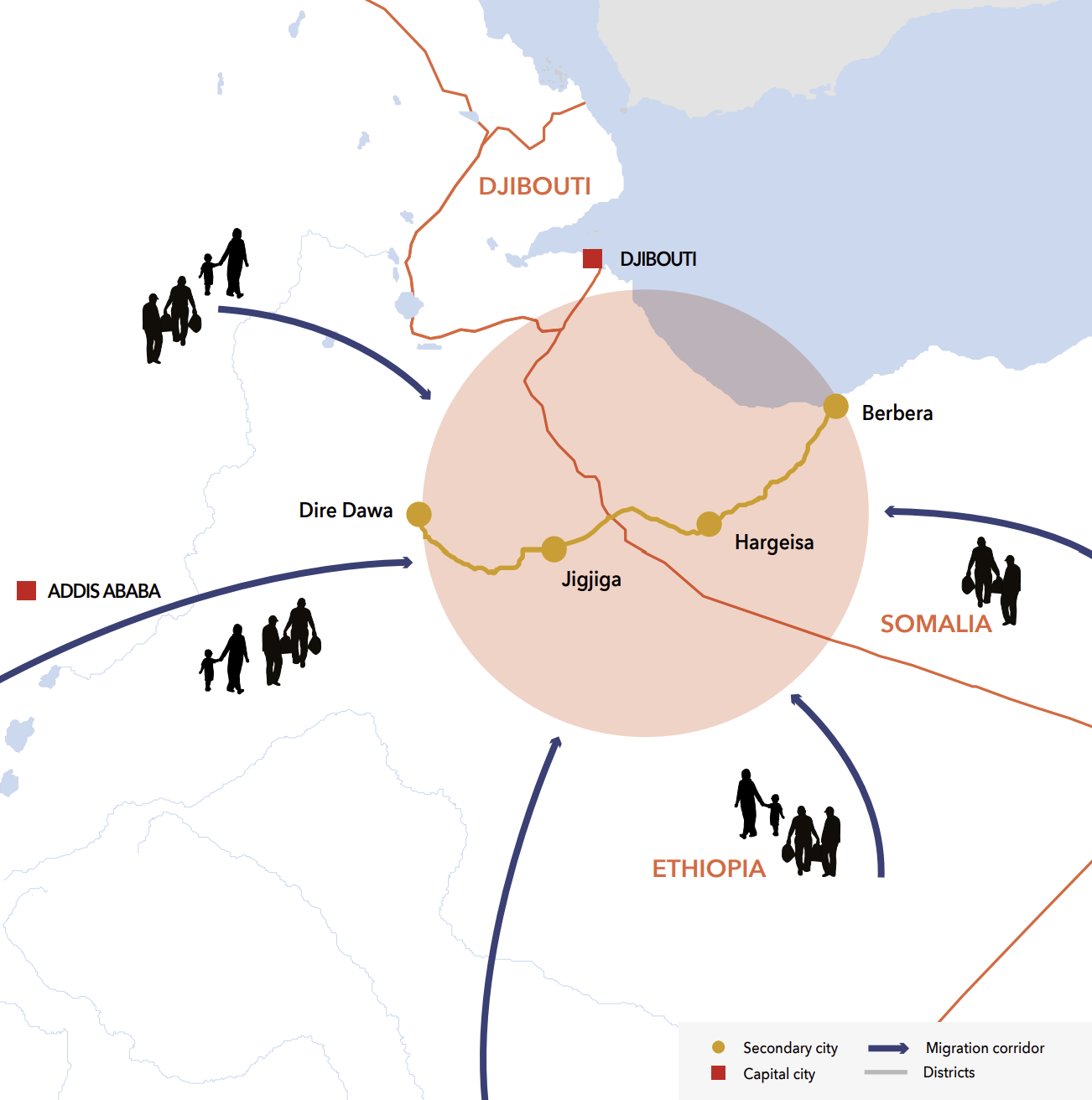The Ethiopian Somali Region and its capital, Jigjiga City, have experienced significant economic growth thanks to the social and financial capital investments by the Somali diaspora and returnees. Somaliland and its capital, Hargeisa, have seen a diaspora-led economic boom as well.
Both areas are also experiencing significant migration influxes, often induced by climate change. These rural-to-urban labour migrants, internally displaced persons (IDPs), and refugees suffer from poverty and exclusion, with women and girls disproportionately affected.
Thus, a key challenge for regional and local authorities is making economic growth more equitable, with more migrants and vulnerable host community members benefiting from increasing economic opportunities and services.
This project is an innovative cross-border partnership between academia, all levels of governance (local, regional, and central), and the private sector. It builds on the respective mandates and core competencies of relevant city stakeholders to propose a substantive set of activities with both short- and long-term potential for sustainable impact.
The Berbera Corridor
The Ethiopian government and international development banks have invested heavily in the region’s infrastructure as part of the Berbera Corridor initiative, which connects landlocked Addis Ababa, Ethiopia, with the port city of Berbera, Somaliland.
The Berbera Corridor is expected to become a major regional trade and logistics hub, with trade volumes expected to increase sixfold by 2050, according to the World Bank.

Partners
Jigjiga University (JJU), in partnership with Jigjiga City Administration and various regional government departments, including the Bureau of Women and Children Affairs, Hargeisa Cultural Institute, Jigjiga University Business Incubation Centre, Rays Microfinance, and the Hankaal Institute.
Activities
The project activities cover job matching, skills development, business incubation, engagement of the diaspora for local investment, and engagement of the local government for job creation and public services such as environment and sanitation.
They include cooperation with a dedicated women’s empowerment organisation, which will drive gender-sensitive activities relevant to localities along the Berbera Corridor.
Over half of the project’s beneficiaries will be women.
Anticipated Results
Access to better work opportunities
At least 4,000 migrants, forcibly displaced, and vulnerable host community persons will receive services that enable them to access new or better work opportunities in Jigjiga City and its surrounding migration corridors.
The project partners will provide business and entrepreneurship training for migrants, the forcibly displaced, and vulnerable host community youth. To ensure sustainability, the project leverages the Jigjiga University Career Centre’s existing platforms and networks for job matching and career counselling.
Business incubation centres will support start-ups and provide mentorship and administrative support, bridging an important gap in the nascent entrepreneurial ecosystem of the Somali Region.
Eventually, new collaboration with a micro-finance partner will make the business case for women-led enterprises and loan products, and digital services will ensure that migrants located in kebeles further away from the urban centre gain access to economic opportunities.
Up to 1,200 beneficiaries will experience new or better work opportunities as a result of the work-related services provided by the project.
Multi-stakeholder dialogues
The project will convene two local multi-stakeholder initiatives and dialogues (on remittances, impact investments and know-how by migrants and diasporas to their country of origin) that engage the private sector, government, and civil society.
Access to basic services
At least 30,000 migrants, forcibly displaced, and vulnerable host community persons will access basic municipal services due to project activities.
An important municipal service is providing market space for people living in Jigjiga and the surrounding areas, but there are not enough organised market spaces and wholesale centres. Most trade is conducted on the streets and at retail prices. The project will establish a wholesale market, managed by the City Administration, that allows target beneficiaries to purchase and trade at significantly lower wholesale prices.
It will also tap into market opportunities at Jigjiga University (JJU). Target beneficiaries, specifically women micro-entrepreneurs, will gain access to business sheds that will function as a market for the university’s 17,000 students.
In collaboration with the JJU Mechanical Engineering Department, a sanitation project will pilot a biogas plant for a toilet at the wholesale market, an Ecosan toilet for compost production at the campus, and mobile toilet facilities for youth start-up initiatives targeting public health and environmental protection in public spaces.
Participatory policy dialogues
The project will convene four local initiatives and policy dialogues on inclusion and social cohesion, including durable solutions for forcibly displaced persons, that engage different actors (governments, private sector, civil society) in the Somali Region and Somaliland.
Dialogues will explore the immense potential for cross-border collaboration through the Berbera Corridor, including learning opportunities between Somaliland’s private sector-led development model and the public sector-led development model of the Somali Region.
A gender analysis and theory of change will inform locally appropriate gender transformative action in the context of cities in the Berbera Corridor. Entrepreneurship training, financial products, and municipal services are all designed to take the local cultural context into account.
The project emphasises women’s empowerment and ensures that over half of all beneficiaries are women. It also focuses on the needs and opportunities of the corridor’s growing youth population.


